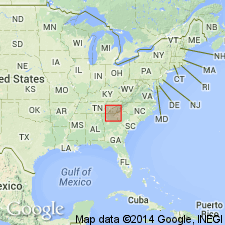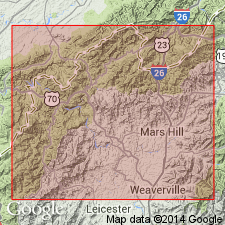
- Usage in publication:
-
- Hurricane graywacke
- Modifications:
-
- Named
- Dominant lithology:
-
- Graywacke
- AAPG geologic province:
-
- Piedmont-Blue Ridge province
- Appalachian basin
Summary:
Named as oldest formation in Ocoee series. Named for town of Hurricane, western NC. In Asheville and several folios, Keith (1904, 1905, 1907, and unpub. Mount Guyot quad) used name Snowbird formation for these beds which he assigned to Lower Cambrian. He included part of Great Smoky conglomerate in Snowbird formation at type locality and elsewhere. In 1904 and 1907, he applied name Snowbird also to well-established Lower Cambrian rocks. For these reasons, it is believed that name Snowbird is misleading, and new name Hurricane should be applied to graywacke underlying Great Smoky quartzite as basal formation of Ocoee. Southeastern belt extends from 3 mi southwest of Erwin, TN, through type locality, and southwestward to northern GA and ends at Mount Oglethorpe. Composed of grayish-black or grayish-green, fine- to medium-grained graywacke. On southeast side of belt of series, rests unconformably on Precambrian injection complex. On northwestern side of belt, exposed in places along Great Smoky overthrust. Occurs in anticlines within belt, and in GA surrounds early Precambrian rocks exposed in Fort Mountain, Corbin, and Salem Church anticlines. North of Blairsville, GA, Hurricane is a basal part of Ocoee series that was mapped as Carolina gneiss by LaForge and Phalen (1913). Southwest of Cartersville, GA, and in AL, formation is green phyllite. In GA (Hayes, unpub. folio) called part of this phyllite Gilmer schist, and Crickmay included it in Talladega series. IN AL, was mapped as Talladega schist by Butts (1926) In Corbin anticline, Hurricane is thrust over Corbin granite. In Fort and Cohutta Mountains, overlies Fort Mountain gneiss. Age is late Precambrian.
Source: GNU records (USGS DDS-6; Reston GNULEX).

- Usage in publication:
-
- Hurricane graywacke
- Modifications:
-
- Not used
- AAPG geologic province:
-
- Piedmont-Blue Ridge province
Summary:
Term Snowbird considered preferable to Hurricane graywacke in this area.
Source: GNU records (USGS DDS-6; Reston GNULEX).
For more information, please contact Nancy Stamm, Geologic Names Committee Secretary.
Asterisk (*) indicates published by U.S. Geological Survey authors.
"No current usage" (†) implies that a name has been abandoned or has fallen into disuse. Former usage and, if known, replacement name given in parentheses ( ).
Slash (/) indicates name conflicts with nomenclatural guidelines (CSN, 1933; ACSN, 1961, 1970; NACSN, 1983, 2005, 2021). May be explained within brackets ([ ]).

